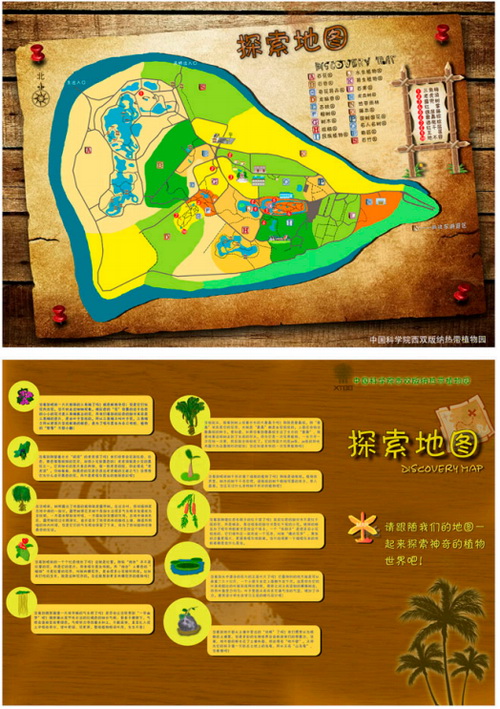The idea of free-choice learning includes all out-of-school information sources, such as museums, botanical gardens, zoos, nature centers, and so forth. Free-choice learning has been practiced in some educational programs within botanical gardens. However, systematic evaluation to determine how these programs affect visitors’ knowledge and attitudes towards nature is lacking.
Prof. CHEN Jin and his student of Xishuangbanna Tropical Botanical Garden (XTBG) conducted a study to develop a plant hunt game called ‘Discovery map” and distributed it to visitors. They aimed to evaluate the potential of discovery maps for the enhancement of the educational function of botanical gardens. The discovery map was designed as an educational tool and ten plant species were chosen for some extraordinary features of their roots, stems, leaves or flowers.
By using a questionnaire survey and behavioral observation of the visitors, the researchers wanted to see whether visitors who used the discovery map (map-users) learned significantly more than those who did not use the discovery map (non-map-users). They further sought whether map-users behaved in a significantly different manner while touring the garden than non-map-users. They also asked whether map-users got significant satisfaction for the tour than non-map-users.
The researcher found that the discovery map enhanced visitors’ curiosity beyond the topics of the map. The map-users tended to spend more time and explored a greater area in the garden, read the interpretation panels more carefully, and to observe the plants more often than non-map-users. Map-users performed significantly better on the knowledge-based questions than non-map-users. And the map-users showed higher willingness to revisit the garden.
The researchers thus suggested that the plant hunts game ‘Discovery map’ should become a common environmental education program to improve visitor’s engagement during the visit and may enhance the effectiveness of environmental education in botanical gardens. Designing some discovery maps with different themes, such as distinctive
plants, endangered plants, flowering plants and so on could be a good way for botanical gardens
to improve visitors’ satisfication.
The study entitled “Using discovery maps as a free-choice learning process can enhance the effectiveness of environmental education in a botanical garden” has been published online in Environmental Education Research. 
Discovery map (Image by YANG Xi)
Contact
CHEN Jin Ph.D Principal Investigator
Key Laboratory of Tropical Forest Ecology, Xishuangbanna Tropical Botanical Garden, Chinese Academy of Sciences, Mengla, Yunnan 666303, China
E-mail:
cj@xtbg.org.cnTel: 86 691 8715457 |

